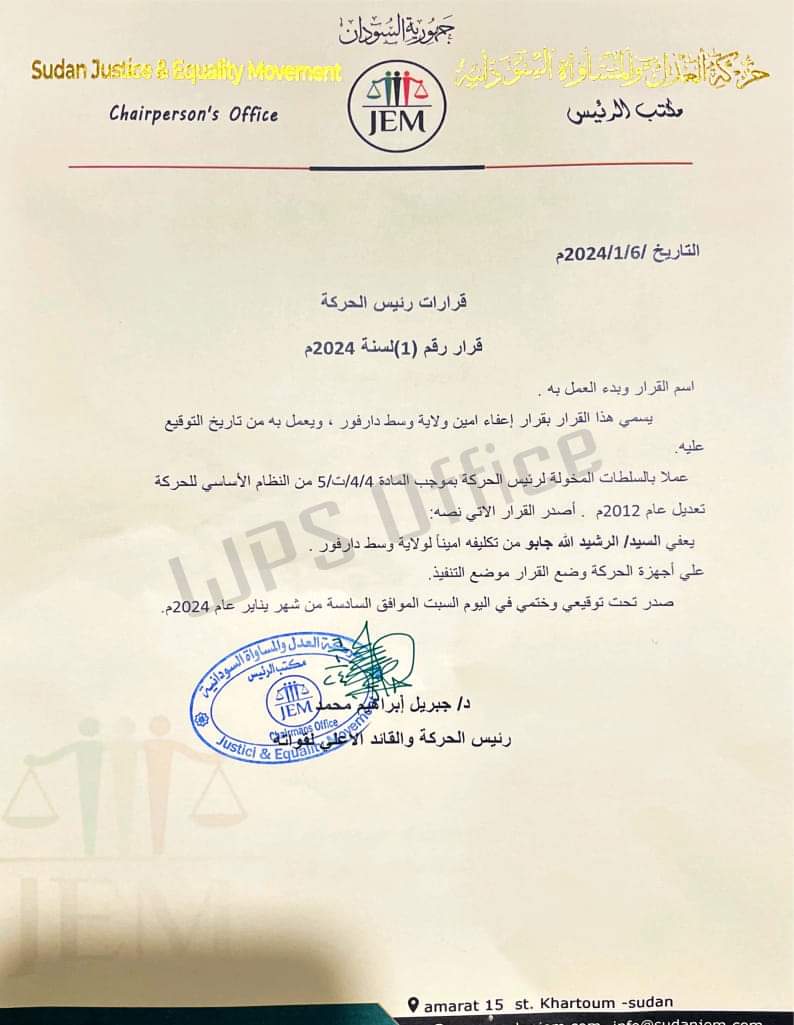Darfur’s Special Prosecutor Resigns
Khartoum — The Sudanese Ministry of Justice issued a statement today revealing
that its special prosecutor for Darfur Abdel-Dayem Zumrawi asked the government
to accept his resignation.
This followed reports this week by local media that Zumrawi, who is also the
Justice Ministry Undersecretary, informed the Sudanese presidency in late March
about his intention to step down.
According to the statement his request was made for personal reasons and has yet
to be accepted.
Zumrawi was appointed last October as a special prosecutor for Darfur to replace
his predecessor Nimr Ibrahim Mohamed who occupied this position since 2003.
But the Justice Ministry stressed in its release that Zumrawi resigned in his
capacity as an Undersecretary and not as a special prosecutor.
Sudan has sought to prove its seriousness in going after perpetrators of war
crimes allegedly committed in Sudan’s western region of Darfur by appointing a
special prosecutor and establishing special courts.
But no progress has been reported in the work of the special prosecutor since
establishing the post.
The United Nations Security Council (UNSC) referred the situation in Darfur to
the International Criminal Court (ICC) in March 2005 after a U.N. international
commission of inquiry concluded that the Sudanese judiciary is unwilling or
unable to carry out credible prosecutions in the war ravaged region.
To date, the Hague tribunal charged three individuals from the government side
including president Omer Hassan Al-Bashir, South Kordofan governor Ahmed Haroun
and militia leader Ali Kushayb.
All three face charges of war crimes and crimes against humanity but Bashir is
also wanted for genocide in connection with claims that he orchestrated a
campaign to wipe out the African tribes of Fur, Zaghawa and Masaalit in Darfur.
Last January, the state minister for justice Bol Lul Wang told Reuters that
Khartoum has not conducted serious investigations into the alleged war crimes in
Darfur. He also claimed that the Sudanese government has no will to go after
suspects because of the high-level position they occupy.
“The prosecutor may find some difficulties taking procedures against them
[Haroun & Kushayb] because they are being protected by the government,” Wang
said.
“These people are high figures in the government. The government has no will to
pursue or even investigate those people … It is not serious. Because if it was
serious they would not let a man like Haroun hold a ministerial post.”
An African Union panel headed by former South African president Thabo Mbeki was
tasked with working on ensuring that Sudan establish mechanisms to bring justice
to Darfuris particularly through hybrid courts as well as making changes to the
penal code.
But Khartoum resisted the idea and Mbeki acknowledged in a report last November
that he had little success in pushing Khartoum to implement his justice
proposals.
U.N. officials estimate that as many as 300,000 people have died in Darfur since
insurgents took up arms in 2003, accusing Khartoum of neglecting the arid
region. Khartoum puts the death toll at around 10,000.
—
لقد تلقيت هذه الرسالة لأنك مشترك في المجموعة
“AbdinList” من مجموعات Google.
للنشر في هذه المجموعة، أرسل بريدًا إلكترونيًا
إلى [email protected]
لإلغاء اشتراكك في هذه المجموعة، أرسل رسالة
إلكترونية إلى
[email protected].
للحصول على مزيد من الخيارات، يمكنك الانتقال
إلى هذه المجموعة على العنوان
http://groups.google.com/group/drabdin?hl=ar.

